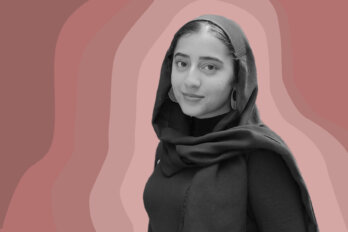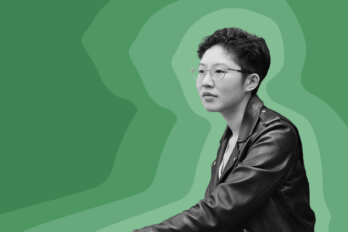Winner of the 2015 Walrus Poetry Prize
One summer in my youth the young girl with the solar system tattooed on her face ruled the Town, and I spent all my nights wishing she would hitchhike to my parents’ farmhouse, kick down the front door, and find me. Lying on top of my quilt I listened for the girl so hard I could hear the tomatoes from our garden drying out in the oven. She fucked all of her friends rotationally, catholically; she fucked the grimy transients who slept rolled in plastic; she fisted the Town councilor who had been fired for using too many words in her speeches. The young girl’s mother had given her a fanciful hippie name and as a child she took a more conventional one, but she could not remain an Amy for long. Her attention could only be captured by the ugliest, most violent, bravest, or most beautiful actions. And it was devastating to watch her blast down the streets, embodying all the inexpressible parts of myself.
I was so full of fear, I felt it from my toes to the ends of my hair. Sometimes I was convinced the fear had existed before I did, for I had been born to a legacy of poverty and filth. In conducting even the mildest conversations with other people, I felt like I was calling up for rescue from the bottom of a well.
Every morning I believed I could hear the good-hearted Townspeople rising from sleep and bending over to touch their toes. I could hear their eggs poaching; I could hear the rich oily flavor being extracted from their coffee beans. And in my youth, I measured their dignity against my family’s degradation, for after my father left the Town paid for nurses to care for my mother, and these nurses quickly grew lazy. My mother made distressed noises when they removed her shirt too roughly, and there were often food stains left on her face. Most days she was left propped up with pillows in front of a TV, vomiting as she was shown clip after clip of nauseating violence.
Watching this used to cause me such pain that I longed to find the girl, chuck my body at her dirty feet, and beg her to lock me in armour. So I’d look for her in the holiest part of the Town: the very edge, near the water, which was the source of disembodied, polyphonic singing. But the singing would always cease as I approached, and hours later I would wake cold and bruised in a field, with no memory.
I wanted to join the girl’s army, if only she would let me. But she left after that summer, while I stayed and conformed to the Town’s punitive geography. Now, I imagine the girl being sewn into a wedding dress. I imagine her being sewn into a shroud. I imagine her being sewn onto my face. I am far too old to be imagining such things. I try to capture the attention of others like her, though I know they will gradually see me with perfect clarity, and find me laughable. Often, my life feels like a record of obsessions. I stand next to girls on the bus and I hope a sudden brake will send them tumbling against me. When seated I pretend to fall asleep so that I may slump onto the shoulders of the girl sitting beside me, only to wake immediately with a start, saying oh pardon me I’m so sorry, I didn’t know I was that tired. And she responds kindly and absently, for I look friendly and middle class, now, in my trench coat and dragonfly hairpin and mint-colored nails; she doesn’t yet see me for who I am, and I wonder, can I be reborn–




